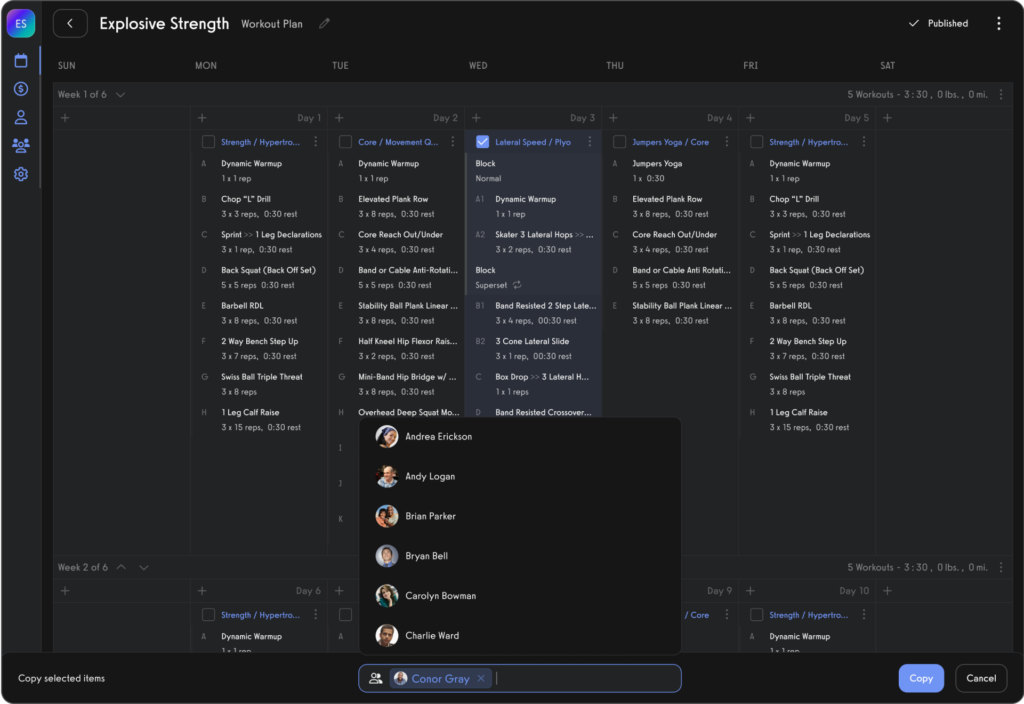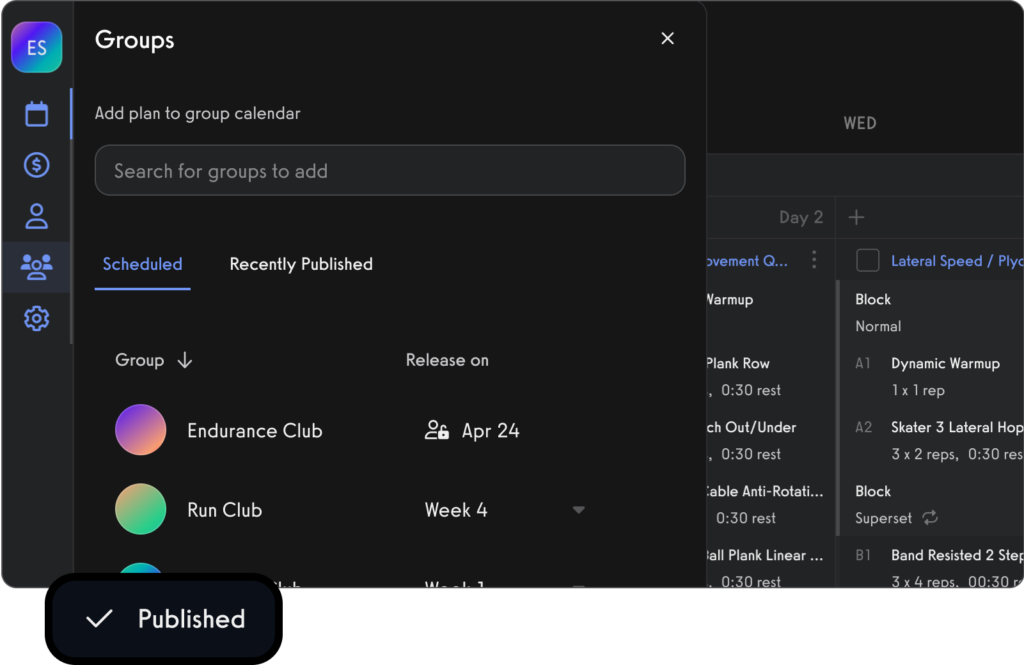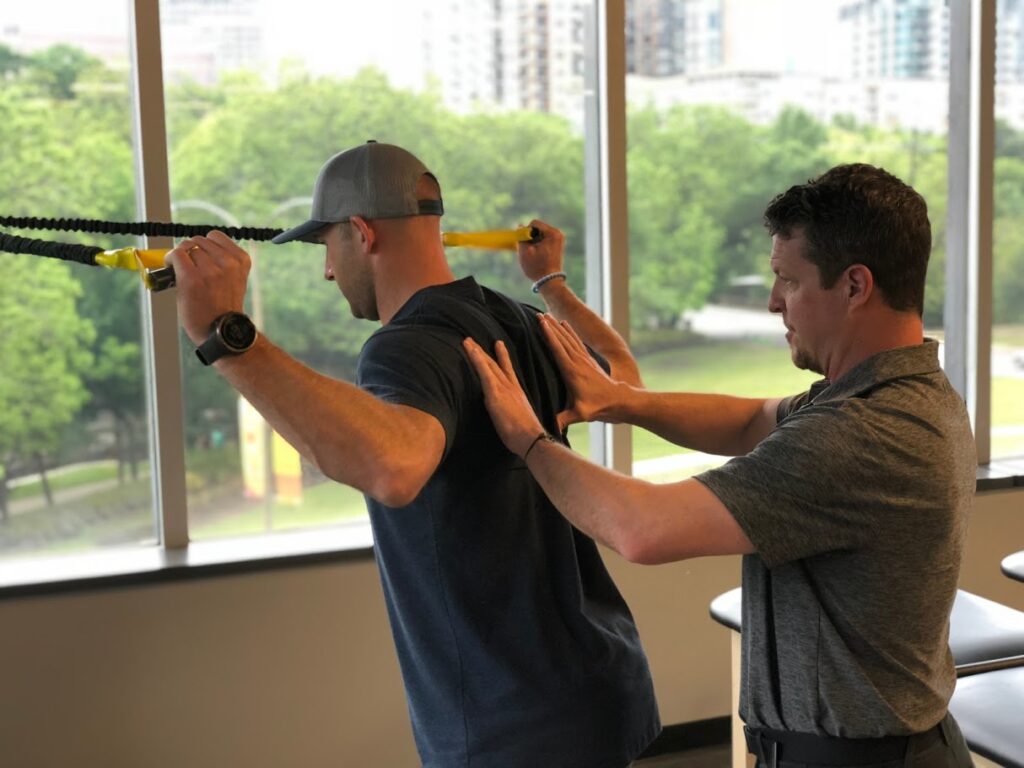Personal Trainer Non Compete Agreement Template (FREE)
Use this free personal trainer non compete agreement template for safeguarding your personal training client relationships in your gym or fitness business.

In today’s highly competitive fitness industry, gym owners and personal trainers need to take necessary steps to protect their business interests. One effective tool that can help gym owners, personal trainers, fitness coaches, and other fitness professionals safeguard their client base, confidential information, and unique training methods is a non compete agreement.

In this article, we will provide a free personal training non compete agreement template, and then delve deep into the world of personal trainer non compete agreements, discussing everything from their importance to key elements, tips for crafting them, common mistakes to avoid, and much more.
And, of course, managing your fitness business online with the best gym management software and the best personal training software means that you can easily create messages and proposals to send to clients with email, SMS, and in-app messaging marketing cadences, you can create fitness session plans, waivers, forms, fitness assessments, lead forms, registration forms, offer online booking, workout plans, and much more.
Use the Exercise.com workout plan creator to create your workout plans and fitness assessments.

Publish your custom branded fitness apps to iOS and Android so you can offer a premium experience to your community.

Run fitness challenges, create online workout groups, do distance training, and of course, deliver fitness assessments and workouts, all right within the Exercise.com platform (custom branded to your brand).


Personal Trainer Non-Compete Agreement Template
[Personal Trainer’s Business or Trainer’s Name Letterhead]
Non-Compete Agreement
This Non-Compete Agreement (“Agreement”) is made effective as of [Effective Date], by and between Trainer’s Full Name or Business Name located at [Trainer’s Address] and Employee’s Full Name located at [Employee’s Address].
1. Purpose:
The purpose of this Agreement is to establish terms under which the Employee agrees not to engage in competition with the Trainer within a specified geographic area and time period following the termination of the Employee’s relationship with the Trainer.
2. Non-Compete Covenant:
The Employee agrees that during the term of employment and for a period of [time period, e.g., 12 months] following termination of employment, regardless of the cause, the Employee will not:
- Directly or indirectly engage in any business that competes with the Trainer.
- Work for any company or business that competes with the Trainer.
- Engage in any activity or investment that would reasonably be expected to compete with the business of the Trainer.
3. Geographic Limitation:
The non-compete covenant shall apply within a radius of [specified distance, e.g., 50 miles] from the Trainer’s primary place of business.
4. Non-Solicitation of Clients:
The Employee agrees not to solicit any client of the Trainer for the purpose of competing with the Trainer during the term of this Agreement and for a period of [time period, e.g., 12 months] after the termination of employment with the Trainer.
5. Non-Solicitation of Employees:
The Employee agrees not to solicit, hire, or attempt to hire any current employees or contractors of the Trainer for their own business or another employer during and for [time period, e.g., 12 months] after their employment with the Trainer.
6. Confidentiality:
The Employee agrees to keep confidential all proprietary information and trade secrets of the Trainer both during and after the term of employment.
7. Breach of Agreement:
In the event of a breach or threatened breach by the Employee of any provision of this Agreement, the Trainer shall be entitled to an injunction restraining the Employee from such breach.
8. Severability:
If any provision of this Agreement is held to be invalid, illegal, or unenforceable, the remaining provisions shall continue in full force and effect.
9. Governing Law:
This Agreement shall be governed by and construed in accordance with the laws of [State/Country].
10. Acknowledgment:
The Employee acknowledges that they have fully read, understand, and voluntarily enter into this Agreement.
Employee’s Signature: ________________________
Date: ____________
Trainer’s Signature: ________________________
Date: ____________
[Additional Notes or Clauses if Any]
This Personal Trainer Non-Compete Agreement Template is designed to protect a fitness business’s interests by establishing clear terms that prevent employees from engaging in competitive activities during and after their employment. It is important to ensure that the terms are fair and legally compliant within the jurisdiction of the business. This template can be customized to fit specific needs and should be reviewed by a legal professional to ensure its enforceability.

Understanding Non Compete Agreements in the Personal Training Industry
Non compete agreements, also known as restrictive covenants or non competition clauses, are legal contracts that restrict an individual’s ability to compete with their former employer or engage in certain activities for a specified period of time and within a defined geographic area. In the personal training industry, these agreements are used to protect the trainer’s business interests, primarily by preventing their clients and sensitive information from falling into the hands of competitors.
To fully comprehend the purpose and scope of non compete agreements in the personal training industry, it is essential to explore the underlying reasons behind their implementation. By understanding the potential threats that personal trainers face, such as clients being poached by rivals or proprietary training methods being replicated, trainers can make informed decisions about the necessity of non compete agreements for their own businesses.
Read More:
The Importance of Non Compete Agreements for Personal Trainers
The fitness industry is constantly evolving and becoming increasingly competitive. Personal trainers invest significant time, effort, and resources into building their client base and developing specialized training techniques. Without adequate protection, all of this hard work can be jeopardized at the hands of unscrupulous individuals or competitors seeking to gain an unfair advantage.
By implementing a non compete agreement, personal trainers can assert their legitimate business interests while discouraging clients and employees from engaging in activities that may harm their business. These agreements act as a deterrent, providing a legal basis for recourse in case of violations and may serve as a powerful tool for negotiation and preventing potential conflicts.
Key Elements of a Personal Trainer Non Compete Agreement
When it comes to crafting a non compete agreement specifically tailored to the personal training industry, certain key elements must be addressed to ensure its effectiveness and enforceability.
Firstly, it is important to clearly define the parties involved and their roles, such as the personal trainer, the client, and any relevant third parties. This helps establish a clear understanding of who is bound by the agreement and who is protected by it.
Secondly, the agreement should specify the scope and duration of the non compete restrictions, including details such as geographic limitations, the length of time the restrictions apply, and the specific activities that are prohibited during this period. Providing clear guidelines helps avoid ambiguity and potential disagreements in the future.
Furthermore, the agreement should outline the potential consequences of breaching the non compete obligations, such as financial penalties or injunctive relief, as well as any procedures for dispute resolution.
Crafting a Personal Trainer Non Compete Agreement: Tips and Best Practices
When crafting a personal trainer non compete agreement, it is important to adhere to certain best practices to maximize its effectiveness and enforceability. These practices include:
1. Seek legal advice: Given the complex and varied nature of non compete agreements, it is crucial to consult with an experienced attorney who specializes in employment or contract law. They can help ensure that the agreement complies with all relevant laws and regulations.
2. Tailor the agreement to your specific needs: Every personal trainer’s business is unique, so it is important to customize the agreement to address your specific requirements and potential risks. This could include adding provisions related to client lists, training methods, or any trade secrets that make your services distinct.
3. Consider the geographic scope: Personal trainers should carefully consider the geographic limitations specified in the agreement. The scope should be reasonable and directly related to their existing client base and the areas in which they conduct their business.
4. Confidentiality provisions: In addition to non compete obligations, personal trainers should include provisions that protect their proprietary information and confidential client data. This can help ensure that clients’ personal information remains confidential and that competitors cannot gain access to privileged knowledge.
Common Mistakes to Avoid in Personal Trainer Non Compete Agreements
While non compete agreements can be highly effective, there are common mistakes that personal trainers should be aware of and strive to avoid when crafting these agreements.
One common mistake is creating overly broad or vague restrictions. Courts are more likely to enforce non compete agreements that are reasonable in scope and necessary to protect a legitimate business interest. Including excessively long time periods or wide geographic limitations may render the agreement unenforceable.
Another mistake is failing to provide consideration to the client in exchange for their agreement to the non compete obligations. Consideration refers to something of value that is exchanged between the parties, such as the provision of specialized training services. Without proper consideration, the agreement may be deemed unenforceable.
Furthermore, personal trainers should avoid using generic templates without customization. A one-size-fits-all approach may not adequately address the unique aspects of their business, potentially leaving them vulnerable to loopholes and limitations.
How to Enforce a Non Compete Agreement as a Personal Trainer
While prevention is always the best approach, personal trainers should be prepared to enforce their non compete agreement if it is violated. Enforcing these agreements can be a complex process, requiring careful documentation, legal advice, and potentially taking legal action if necessary.
In the event of a violation, personal trainers should initially attempt to resolve the matter through negotiation or mediation. Informal discussions can often lead to a resolution without the need for costly and time-consuming litigation. However, if these attempts fail, it may be necessary to pursue legal action and seek available remedies such as damages or injunctive relief to halt the competing activities.
Exploring the Legal Implications of Personal Trainer Non Compete Agreements
Non compete agreements are subject to legal scrutiny and can vary in enforceability depending on jurisdictional laws and specific circumstances. Understanding the legal implications surrounding these agreements is crucial for personal trainers seeking to protect their business interests and ensure compliance with applicable laws.
It is important to note that non compete agreements must be reasonable in terms of scope, duration, and geographic restrictions. Courts often assess whether the agreements are necessary to protect a legitimate business interest, such as trade secrets or confidential client information.
Pros and Cons of Using a Template for Your Personal Trainer Non Compete Agreement
When creating a personal trainer non compete agreement, trainers have the option to utilize pre-made templates available online. While templates offer a convenient starting point, it is important to weigh the potential pros and cons before relying solely on a generic document.
One advantage of using a template is the time-saving element. Templates provide a standardized structure and language, helping trainers rapidly create an agreement that addresses common elements and requirements.
However, using a template without customization may result in an agreement that does not fully capture the specific needs and risks of a personal trainer’s business. Additionally, templates cannot take into account jurisdictional variations in employment law or the unique characteristics of each business.
Customizing Your Personal Trainer Non Compete Agreement Template for Maximum Protection
To maximize the protection offered by a non compete agreement template, personal trainers should consider customizing the document to suit their distinct business requirements. Customization involves tailoring the agreement to reflect the specific clientele, geographic scope, training methods, and any other aspects that make the personal trainer’s services unique.
By customizing a template, personal trainers can address potential risks that are specific to their industry, ensuring that the agreement provides the desired level of protection.
Understanding the Scope and Duration of Personal Trainer Non Compete Agreements
The scope and duration of personal trainer non compete agreements can vary based on a variety of factors, including industry practices, geographic considerations, and the specific needs and characteristics of each personal trainer’s business.
When determining the scope, personal trainers should take into account their geographic location, the size of their client base, and any relevant market factors. Restricting competition to a reasonable area ensures that trainers can continue serving existing clients while protecting their interests.
Similarly, the duration of non compete agreements must be reasonable and directly related to the specific circumstances. Longer durations may be more feasible when restricting competition in niche markets, whereas shorter durations might be sufficient in areas with high turnover or less specialized training services.
Negotiating and Modifying a Personal Trainer Non Compete Agreement
Non compete agreements can be subject to negotiation, particularly when entering into an employment relationship or when modifications are required to suit changing circumstances. Personal trainers should approach any negotiation or modification process with careful consideration and seek legal advice if necessary.
During the negotiation process, personal trainers should be prepared to listen to feedback and understand the concerns of the other party. Flexibility and willingness to find mutually beneficial solutions can often result in a more solid agreement and a stronger working relationship.
Alternatives to Traditional Non Compete Agreements for Personal Trainers
While traditional non compete agreements can offer valuable protection, it is important for personal trainers to be aware of alternative approaches that might suit their needs and circumstances.
One alternative is a non-solicitation agreement, which focuses solely on preventing the solicitation of clients by former employees or business partners. By limiting the scope of restrictions to client solicitation, personal trainers can ensure that their clients remain loyal and retain the freedom to seek training services.
Another alternative is a confidentiality agreement, which protects sensitive information, trade secrets, and any proprietary knowledge held by the personal trainer. This can be particularly useful when the primary concern revolves around preserving unique training methods or proprietary programs.
Case Studies: Learn from Real-Life Examples of Personal Trainer Non Compete Agreements
Examining real-life case studies can provide personal trainers with valuable insights into the intricacies and potential pitfalls of non compete agreements in the personal training industry.
Case studies can demonstrate the effectiveness or limitations of non compete agreements, showcasing how different courts interpret and enforce these agreements. By learning from past experiences of others, personal trainers can better structure their own agreements to minimize vulnerabilities and maximize protection.
How to Handle Violations of a Personal Trainer Non Compete Agreement
In the unfortunate event that a personal trainer’s non compete agreement is violated, it is crucial to handle the situation promptly and effectively. Taking appropriate action can help protect the trainer’s business interests, maintain client loyalty, and deter future violations.
When faced with a violation, personal trainers should gather all relevant evidence, such as documentation or witness statements, to demonstrate the breach. It is also important to consult with legal counsel to understand the available options and potential strategies for resolution. Mediation or negotiation can often resolve disputes without resorting to costly litigation.
Balancing Client Interests with the Need for a Personal Trainer’s Mobility: A Discussion on Non Compete Agreements
While non compete agreements help protect personal trainers’ business interests, it is essential to strike a balance between these interests and the needs of clients. Personal trainers provide valuable services to their clients, and clients should have the freedom to choose trainers that best suit their needs.
By examining the ethical considerations associated with non compete agreements, personal trainers can ensure that their agreements are reasonable and fair. Implementing non compete agreements that allow for client choice and mobility can foster trust, build rapport, and maintain positive client relationships.
The Future of Non Compete Agreements in the Evolving Landscape of the Fitness Industry
As the fitness industry continues to evolve, so too will the approach to non compete agreements. With emerging technologies, changing business models, and evolving consumer preferences, personal trainers should stay informed about industry trends and legal developments that may impact the effectiveness and enforceability of non compete agreements.
Moreover, personal trainers should be prepared to adapt their non compete agreements to meet the changing demands of the fitness industry. Flexibility and foresight will be essential in order to protect their business interests and remain competitive in a rapidly evolving landscape.
By thoroughly understanding the nuances of personal trainer non compete agreements, personal trainers can take proactive steps to protect their business interests, preserve client relationships, and secure their position in the competitive fitness industry.
Remember, the key to creating an effective non compete agreement lies in careful consideration, customization, and seeking legal advice when necessary. Armed with this knowledge and armed with a comprehensive non compete agreement, personal trainers can confidently pursue their business goals while ensuring their professional success.
What is the non-compete clause for personal trainers?
A non-compete clause for personal trainers is a part of a contract that restricts the trainer from working in competing fitness businesses or starting a similar business within a specific geographical area and time frame after leaving their current employer.
How do you write a non-compete agreement for personal trainers?
To write a non-compete agreement for personal trainers, clearly define the geographical area and duration of the restriction. Specify the type of work or business activities that are prohibited. It’s crucial to ensure the terms are reasonable and legally enforceable.
Is there any way around a non-compete agreement?
Navigating around a non-compete agreement can be challenging. The enforceability often depends on the reasonableness of the terms and local laws. Consulting a legal expert is advisable for exploring potential options or negotiating terms.
What voids a noncompete agreement?
A noncompete agreement can be voided if deemed unreasonable in its duration, geographic scope, or if it excessively restricts a person’s ability to earn a living. Unenforceability can also occur if the agreement lacks consideration or if the terms violate state laws.
What is a reasonable non-compete clause?
A reasonable non-compete clause typically has a limited duration (often one year or less), a reasonable geographic scope relative to the employer’s market, and is specific about the types of employment or business activities that are restricted.
Can a gym hold you to a non-compete?
A gym can hold you to a non-compete if the agreement is reasonable, legally binding, and in compliance with local laws. The enforceability largely depends on the agreement’s fairness and the jurisdiction’s legal stance on non-compete clauses.
What does a typical gym or personal trainer non-compete agreement look like?
A typical gym or personal trainer non-compete agreement includes a specific geographic radius in which the trainer cannot compete, a defined period, and details on the types of services or business activities that are restricted.
How legally binding is a fitness business non-compete?
The legal binding nature of a fitness business non-compete depends on its terms and local laws. If it’s reasonable and doesn’t overly restrict the trainer’s ability to work, it’s more likely to be enforceable.
Can you say no to a non-compete?
You can say no to a non-compete, but this might affect your employment terms. Negotiating the terms or seeking legal advice before signing is advisable if you have concerns.
How can Exercise.com help me run my fitness business?
Exercise.com can help run your fitness business by offering comprehensive software solutions for client management, workout programming, scheduling, tracking, billing, and communication. Its platform streamlines operations, enhances client engagement, and supports business growth, allowing you to focus on providing quality fitness services.










